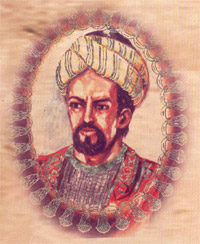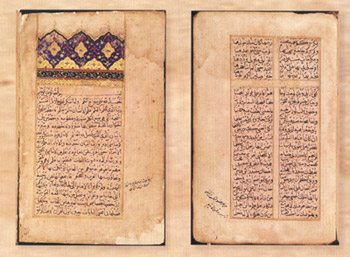|
 The
art of Arabic poetry is one of the
disciplines, which characterize the Arab
people. It has a unique nature among the
broad field of world poetry. Reflecting
the people who create it and the tongue
they speak, Arabic poetry is essentially
founded on sound synchronizations and
abrupt powerful expression. Thus, verses
are brief, and Arab poets tend to opt for
a handful of dazzling paragraphs rather
than a prolonged storytelling effect.
Indeed, the paramount works in Arabic
poetry are short and they emanate
extraordinary impact for the native
reader. Throughout history, in the Arab
lands, the Arab rulers found inspiration
and entertainment in the verses of their
court poets.
The
art of Arabic poetry is one of the
disciplines, which characterize the Arab
people. It has a unique nature among the
broad field of world poetry. Reflecting
the people who create it and the tongue
they speak, Arabic poetry is essentially
founded on sound synchronizations and
abrupt powerful expression. Thus, verses
are brief, and Arab poets tend to opt for
a handful of dazzling paragraphs rather
than a prolonged storytelling effect.
Indeed, the paramount works in Arabic
poetry are short and they emanate
extraordinary impact for the native
reader. Throughout history, in the Arab
lands, the Arab rulers found inspiration
and entertainment in the verses of their
court poets.
It was one such poet who became the most
renowned of all the Arab poets ever. This
was a man by the name of
Abu at-Tayyib Ahmad ibn Huseyn Al
Mutanabbi.
Among other things, Al Mutanabbi rose to
fame with his marvelous metaphors and
ornate enhancements of the language. Over
a couple of dozen reviews have been
written to examine and interpret the
subtle, almost hidden messages in his
verse. And indeed, they were in fact less
than direct to the less experienced
reader. For example, in one of his most
famous paragraphs, Al Mutanabbi portrays
an approaching multitude of soldiers as a
crowd so huge that "The warriors marched
hidden in their dust and saw with their
ears just." Some interpretations put it in
plain words that this means that the
soldiers' senses were mystified in the
commotion, so that although they thought
they were seeing, they were in fact
hearing the tumult surrounding them.
Sadly enough, it is often asserted that in
translation, Mutanabbi's verses completely
lose their essence. What do Arabic
native speakers regard as the perfection
of Arabic literature can seldom be shared
outside of the Arabic realm. The following
passages provide an account of the life
and significance of the great poet.
The Life of Al Mutanabbi
Abu at-Tayyib Ahmad ibn Huseyn Al Mutanabbi was
born long ago in 915. His place of birth
was the town of Al Kufah in Iraq. Little
Al Mutanabbi was the son of a water
carrier who was supposedly of noble and
ancient southern Arabian descent. In his
youth, Al Mutanabbi was well educated in
Syria in Damascus, which he partly earned
because of his lyrical
abilities. Having lived closely among the
Bedouin of the Banu Qalb tribe, he learnt
their doctrines and Arabic.
It was in his youth that he won his
nickname "Al Mutanabbi", which means “the
one who wants to become a Prophet”. Why he
was named so is only partly clear.
According to some interpretations, he
likened himself to the Prophet Salih in
some of his verses. Others claim it is his
political activities that won the young
poet the unusual name. He was the leader
of a revolutionary movement and, claiming
to be a Prophet, led a revolt in his home
town in 932.
The revolt was suppressed and the young
man was imprisoned. It is during this
period that he began to write his first
poems.
Al-Mutanabbi’s involvement in politics did
not end with the unsuccessful revolt.
Throughout his whole life he would aspire
towards political influence, although his
aspirations were never rewarded. He
travelled from Iraq to Syria, Egypt and
Iran in search of an influential patron
that would eventually appoint him as
governor of a province. However, while his
poetic talent was widely acclaimed
everywhere he went, his skills in handling
the matters of state were never recognized
as such.
His political ambitions first lead him to
Aleppo in Northern Syria, where he joined
the court of Prince Saif al Dawla. From
his arrival in 948, Al Mutanabbi enjoyed
the protection of the prince for some nine
years, before his political aspirations
caused him to loose his patron’s favours
and made leaving the country the only
option on hand. In
957 he was forced to flee to Egypt, which
was at that time ruled by the Ikhshidis.
In Egypt the poet won the protection of
the regent, Abu al Misk Kafur, but his
favours were not bestowed on Al Mutanabbi
for a long time. He had to flee this
country in 960, after he wrote several
satirical poems that presented the court
in a bad light.
The poet’s tumultuous path then lead to
Shiraz, Iran, where he gained the
protection of the Adud ad-Dawlah and
worked as court poet until 965. It was in
this same year when he found his death.
Having returned to Iraq, he was attacked
and killed by bandits in a trip in the
vicinity of Baghdad.
Understanding Al Mutanabbi
The bold imagination and hypnotizing
metaphors and hyperboles induced many to
call Al Mutanabbi the most important
representative of the panegyric poetic
style. To understand Al Mutanabbi’s
significance for Arabic poetry, one needs
to take a closer look at the genres
predominant at the time.
These were, as they emerged according to
traditional rules, the ghazal,
which usually embodied a love poem, the
qitah,
a less serious literary form exploring the
humorous side of life; and the qasidah,
which Al Mutanabbi, with his assertive and
more personal style, followed but slightly
modified.

The qasidah poetic form was born at
the dawn of Arabic society before Islamic
times. It developed from the
first type of Arabic literature, which
essentially was the courageous and daring
verses of the proud families of the early
Arabs. In its essence, the qasidah
described episodes from the author's life
experience or that of his close ones. This
was done with a vivid and very impactive
aroma.
The structure of the qasidah consists of twenty to over one
hundred verses. Adhering to the standard
outline, the verses keep to a preset
arrangement. In the beginning, there is an
overture, which is essentially a love poem
prologue, known as nasib. After
this comes the account of the author’s
experience. Then comes the conclusion with
a section, which was used exclusively to
praise the benefactor of the author and to
criticize his enemies. In some rare cases,
the poet took the liberty to end with a
section of self-praise, and al Mutanabbi
used this chance on several occasions. The
qasidah sounded very appealing to
Arabs from all walks of life and became
recognized as the common form of panegyric
– generally, a eulogistic oration or
laudatory discourse to elevate a
particular ruler.
Apart from the above mentioned purpose,
the qasidah was also used for
sacred reasons. Further in its
development, the prologue section of the
qasidah became occasionally an
eloquent sketch of nature or a passage
filled with meaningful words of wisdom. In
some more rare cases, the author’s only
aim in this opening was to make obvious
his mastery in expressing himself in the
Arabic tongue.
Al Mutanabbi did go one better than all
conventional qasidah poets in the
lavishness of what has been referred to as
his “reckless audacity of imagination.” As
a poet, he experimented and mixed facets
from Syrian, Egyptian, and Iraqi
influences with orthodox Arabic standards.
The works he wrote – his panegyrics of his
patrons with short abrupt verses, which
are still quoted today – have always
managed to capture the attention of Arabs
and especially their rulers. Armed with
the qasidah’s audacious
overstatements and its splendid resonance,
Al Mutanabbi has always enjoyed a broad
sphere of admirers. Again, the
western reader is unlikely to derive as
much artistic enjoyment from Mutanabbi’s
poetry as does one whose native tongue is
Arabic.
Openly swollen with pride of his supremacy
as a poet, Al Mutanabbi often sang his own
praises with sentences such as this famous
one: "The desert knows me well, the night
and the mounted men,
the battle and the sword, the paper and
the pen"
A deeper grasp of Al-Mutanabbi’s outstanding ability requires an
understanding of the skills a writer had
to posses in the Arab world. First of all,
the poet had to be resourceful and thus
well educated. He had to have more than
general knowledge about the classics of
Arabic and Persian literature. In
addition, he had to be well informed about
the different scientific disciplines and,
most importantly, to feel comfortable with
the native myths, legends, common beliefs,
and traditions. He had to construct an
entertaining blend of these and other
elements and to make references to them in
his poems. These mixes were masterfully
used by Al Mutanabbi; they resulted in
imaginary scenes and settings, oftentimes
based on hobbies of the rulers such as
shatranj or chess, polo, hunting and
others.
As other experienced poets of the time, Al
Mutanabbi also played with puns to make
his point in an entertaining way. Taking
it even further, he even composed
paragraphs that could have an alternative
meaning altogether when read backward word
by word. He also had to be comfortable
using chronograms, cores originating from
the numerical values of a phrase or verse,
which when deciphered, revealed the time
and day of a specific pertinent occurrence
or experience. This becomes apparent with
this passage from one of Mutanabbi’s
poems: “Glory
and honour were healed when you were
healed, and your pain passed on to your
very enemies. Light, that had left the
sun, as if it was sick in its body, came
back to it again. By race, the Arabs are
the supreme in the world, but a foreigner
will take part with the Arabs of good
heart.”
Al-Mutanabbi's pride often entered the
realm of arrogance. It was the foundation
of much of his writings. In a sense, Al
Mutanabbi was a very controversial figure
of his time. His poetry achieved much
success with its opulently metaphorical
and skillfully attacking or slyly praising
qasidahs. His subject matters
always bring to mind the time-honored and
accepted Arab intrinsic worth of
reliability, respect, companionship,
courage, and gallantry.
During Al
Mutanabbi’s lifetime and till our present
day, his poetry attracted and attracts a
great deal of interest. As with many
controversial figures in history, the
censure he received at times gave him
popularity and opened the doors of his
patrons in the cultural centers of the
Arab world in the tenth century. Today, Al
Mutanabbi remains somewhat unknowable.
There is an aura of a hint of vagueness
about his works and himself as a person.
Not much is known of his personal life.
Maybe this will drive more contemporary
readers to his works. Maybe he has
revealed more of himself to us in the
qasidahs he wrote. Maybe this,
together with his personality and poetic
talent, remains exciting, stimulating and
appealing to his readers.
|
